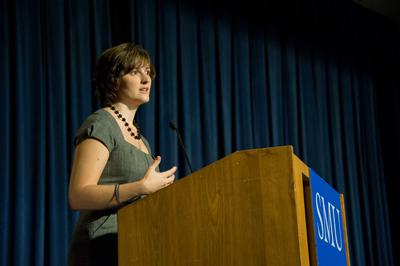
Sandra Fluke visited campus on Monday to discuss women’s health issues, especially at the federal level. (Sidney Hollingsworth/The Daily Campus)
The Women’s and Gender Studies Program hosted “Economics and Equality: How Obstacles to Women’s Health Care Can Affect Us All” at SMU. Journalism professor Karen Thomas moderated the panel symposium featuring Sandra Fluke Monday night.
Charles E. Curran, SMU’s Elizabeth Scurlock University Professor of Human Values, associate provost and Dedman Law School professor Linda Eads and Ken Lambrecht, president and chief executive officer of Planned Parenthood North Texas, sat on the discussion panel.
“I’d like to begin with a caveat: if you’ve come to see how slutty I am in person, you are probably going to be disappointed with the content of my discussion,” Fluke at the start of her speech, referring to the Rush Limbaugh controversy that first thrust her into the spotlight, said.
After responding to “misconceptions” regarding her remarks to the Democratic members of the House in February, Fluke recognized that limiting women’s access to affordable contraceptives deprives a very specific group of women of their rights to health care.
She said giving insurers the choice to cover the cost of contraceptives or not is “an incredible personal choice to hand over to your employer.”
Eads framed her discussion of women’s health and legislation with regards to constitutional law, stating that the issue could be discussed in terms of constitutional privacy and freedom of religion.
“Government cannot control our procreation. Is there anything more an anathema to a human being than to have the government, to have politicians, control procreation?” Eads said.
Curran called a proposed compromise “brilliant in many ways.” The new legislation would allow the government to step in and offset the high costs of contraceptives when a woman’s place of employment or other nonprofit agency offering her insurance coverage is opposed to contraceptives.
“No compromise is perfect, but let’s face it – the whole political spectrum today, both left and right, is unwilling to compromise,” Curran said.
Lambrecht closed the panel by highlighting the importance of women’s health centers like Planned Parenthood. Legislation, like Title 10, has stripped $75 million from the Texas state budget and led to the closure of 60 Planned Parenthood centers.
Despite the reduced budget, Lambrecht said there has actually been an increase in government and taxpayer spending on women’s care.
Thomas and audience members followed up his comment with many questions. The questions posed covered abortion, global women’s health care, social movements, political agenda setting and family planning. The conversation greatly impressed SMU Student Senate Vice President Zane Cavender.
“Regardless of personal beliefs or ideals, it is phenomenal that SMU could host this event,” Cavendar said.
“It truly demonstrates the caliber of our university and its student body.”
Fluke ended the program by thanking the audience for attending and a challenge for future conversation.
“Respect and honor each other’s choices,” she said. “No matter one’s personal views.”








